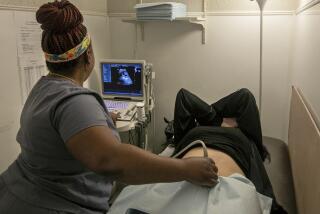Spared a Choice and Glad of It
- Share via
With today’s prenatal testing techniques, our friend said, it is no longer necessary for people to bear the burden of a child with Down syndrome. Then she said, in what was more statement than question, “If you had had the advantage of such tests, surely you would have opted for an abortion?”
Prenatal testing was unheard of when our son Andrew was born 37 years ago with Down syndrome, saving us the agony of choice. Today, a mother-to-be can have definitive tests such as ultrasound, chorionic villus sampling or amniocentesis to determine the health of her unborn child.
Chorionic villus sampling (CVS) involves inserting a catheter through the cervix or a needle through the abdominal wall to take a small sample of the placenta containing fetal cells, which are tested for abnormalities. This procedure can be performed between the ninth and 11th weeks of the pregnancy, and the results usually are available in a few days.
During amniocentesis, a syringe inserted through the abdominal wall removes about one ounce of fluid from the amniotic sac. The test is more accurate and less risky than CVS but is usually done later, 15 to 18 weeks after conception. In addition, it takes three to four weeks to culture and analyze the cells.
For most mothers under 35, these procedures incur a higher risk of miscarriage than of carrying a defective baby.
Should women be pressured into testing? If the test indicates an abnormality, should they be encouraged to consider abortion? Under the National Health Service of Great Britain, doctors insist on testing women over 35 and the NHS provides free abortions. Dominic Lawson, whose wife had recently given birth to a baby with Down syndrome, wrote in the June 1995 edition of the Spectator, “This is nothing less than state sponsored annihilation of viable, sentient fetuses.”
With more women pursuing demanding careers, childbearing often is delayed until the mid-30s, increasing the potential for conceiving a baby with Down syndrome or other disability. Although no specific cause for abnormal cell development has been firmly established, statistics show that the chances of producing a defective fetus, in particular one with an extra 21st chromosome (Down syndrome) increase rapidly after the age of 35.
I know a couple in their mid-30s who decided not to have any tests and just accept whatever happened. Although disappointed at first after the arrival of a baby with Down syndrome, they are now delighted with their special daughter. Others have valid reasons for feeling that they couldn’t cope with a seriously or even mildly disabled child. They feel that their life would be disrupted to the point of threatening the stability of the whole family. Even a normal child can challenge our abilities to cope, but a disabled child is a far greater responsibility.
Couples faced with these dilemmas should receive the best possible medical advice, including genetic and psychological counseling. But no one should force them into testing or selective abortion; ultimately, only they can make the final decision about whether the fetus should live or die. For those couples who feel unable to take on the responsibility of a defective child and cannot deal with the trauma and guilt of abortion, there are people waiting to adopt children with Down syndrome.
How did we react to our friend’s question? At the time of Andrew’s birth, we were told our child would be severely retarded, never learn to read or write, ride a bicycle or develop into a self sufficient adult. The doctor recommended institutionalization. Had we been faced with such a grim prognosis a few months earlier, we might have chosen to terminate the pregnancy. But now, having seen how different his life has been from that early forecast, we would vote unequivocally to bring him into the world. After graduating from a special education program in high school, Andrew took regular classes in a city college and has held the same job in a supermarket for 12 years. His happy aura has strengthened our love, created a foundation for family togetherness, influenced our other children’s approach to life and imbued us all with a greater sense of humanity.
More to Read
Sign up for Essential California
The most important California stories and recommendations in your inbox every morning.
You may occasionally receive promotional content from the Los Angeles Times.













